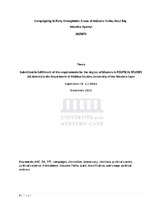Campaigning in Party Strongholds: A case of Imizamo Yethu, Hout Bay.
Abstract
The ability to campaign freely in the run-up to elections is seen as a critical part of democracy.
This study seeks to establish whether South African political parties can campaign freely in
township areas, without fear of intimidation or violence, or whether they remain closed party
strongholds. This paper examines what constitutes a �free and fair� campaign space. This study
then explores the 2014 election campaigns of the Democratic Alliance (DA) and the Economic
Freedom Fighters (EFF) in the township of Imizamo Yethu in Hout Bay in the Western Cape and
examines party campaigning in that particular township.
The study looks at the perceptions of political parties and the community members with regard
to the campaign process in Imizamo Yethu. It looks at how both the governing and the
opposition parties experienced campaigning in this area, which is the stronghold of the ANC,
and how free and fair they think the whole process was. Community members� perception of
the political parties is also examined. This study finds that opposition parties experienced a
number of challenges while campaigning in this area. Some of these challenges were that the
people in the area were not very receptive to other parties that are not the ANC due to factors
such as party identification and clientelistic relationships that exist in the community. The study
then concludes that even though these issues are not sole contributors, they play a significant
role in influencing people�s voting decisions and how they view political parties.

